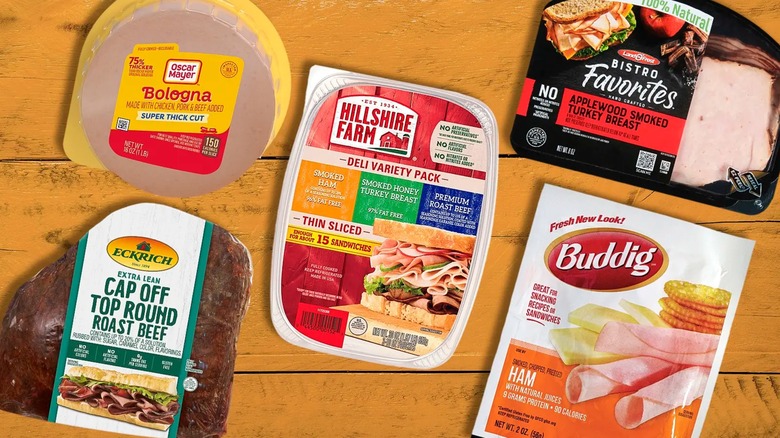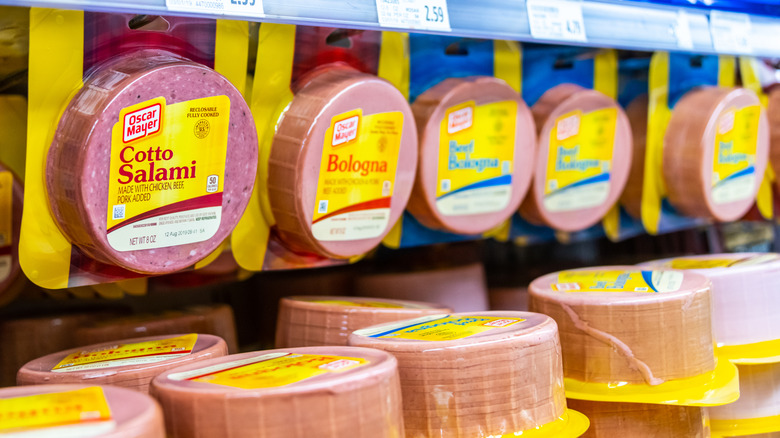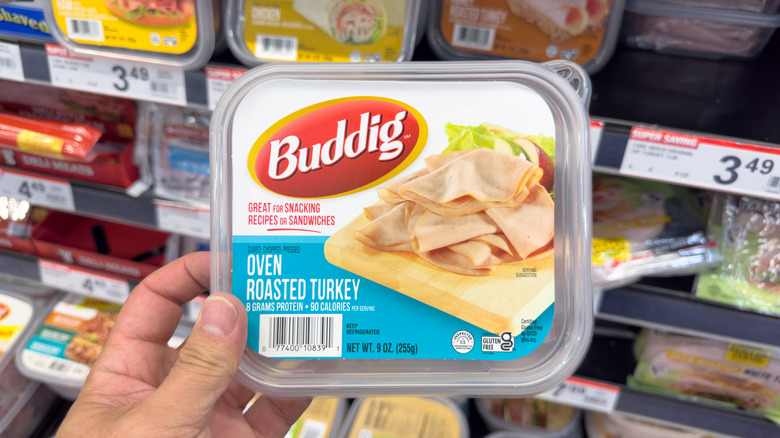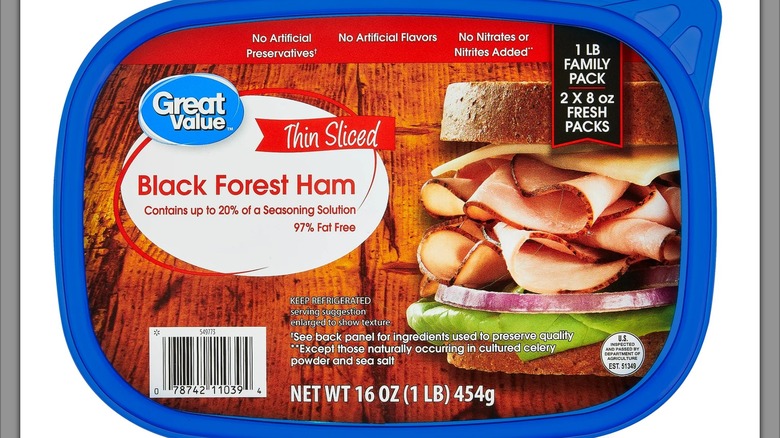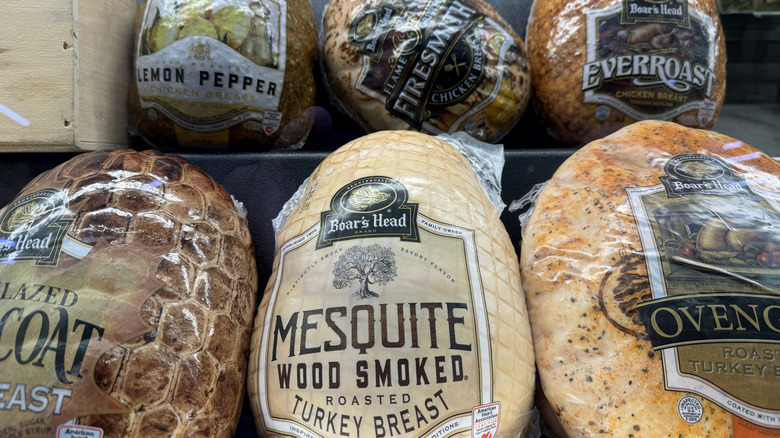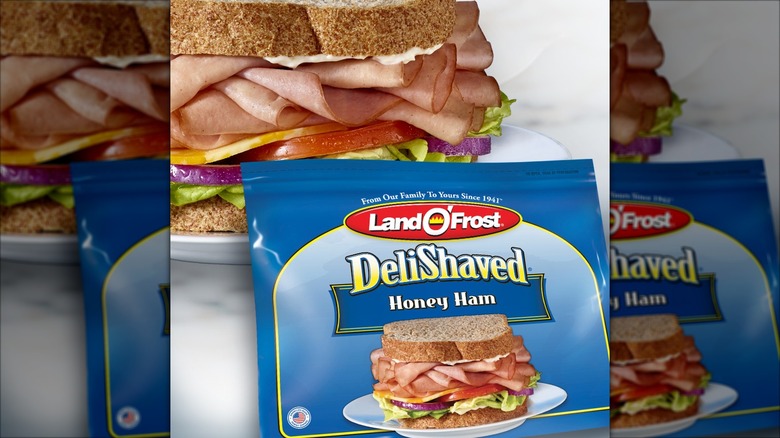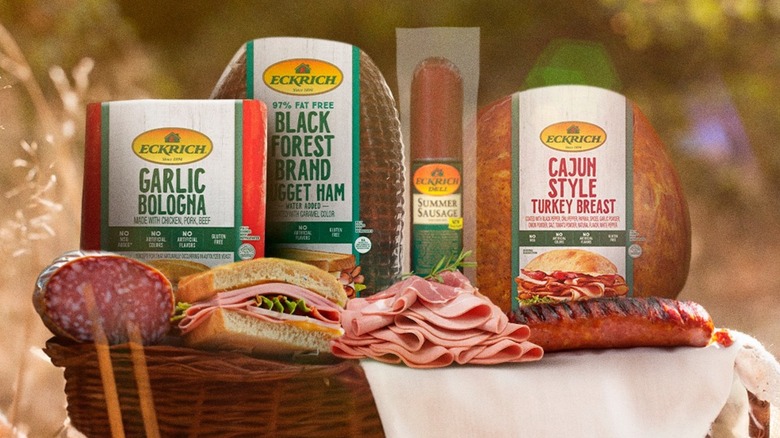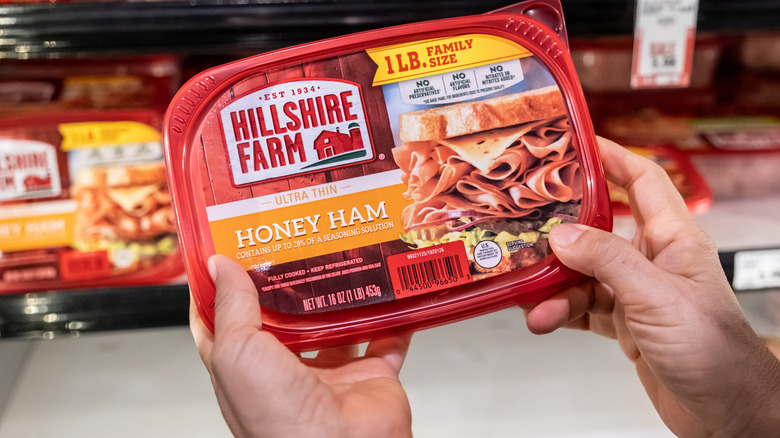10 Packaged Deli Meats With The Lowest Quality Ingredients
If there's anything that we here at Tasting Table like better than a truly delicious meal, it's a delicious meal that's quick and easy. Enter deli meats. While there's a lot that's not great about the 21st century, we will say that the deli meat selection at most grocery stores is brilliant. You can find a wide variety of different types of ham and no shortage of options for adding some fun deli meats to your next homemade pizza. Unfortunately, not all deli meats are created equal.
We wanted to get to the bottom of just what goes into some of the different types of deli meats you might find on the shelves of your favorite grocery stores, and specifically, we decided to look at those that you might want to stay away from. Sure, you might know that it always pays to use thin-sliced meats on your sandwiches, but do you know what goes into processing those meats?
When we talk about low-quality ingredients, there are a couple of things that we're looking for. In addition to brand statements regarding the use of hormones and antibiotics in the supply chain, we also kept an eye out for things like a large number of additives, preservatives, and sodium. It's surprisingly tricky. When you slice your own deli-style meats at home, you probably use something like a fresh turkey breast or ham. It's easy to assume that's what goes into the pre-sliced packages you buy, but that's not always the case.
Oscar Mayer
Oscar Mayer introduced America to the idea of the food truck back in the 1930s, and that's a legitimately neat foodie fact. However, this brand has a reputation for being highly processed, and it's no secret that if you're looking for something with a long shelf life, Oscar Mayer has your back. That comes at a cost, though, and the process of ensuring these meats stay safe for a long time means that nutritionists and dieticians often consider it one of the most unhealthy brands.
Oscar Mayer has a wide variety of deli meats in its lineup, but let's look at some examples. It's perhaps unsurprising that the Environmental Working Group gives Oscar Mayer's bologna the worst score possible for a number of reasons, including the likelihood of antibiotics and hormones in the food chain and ingredients that include sodium nitrite — which has been linked to increasing risk of certain types of cancers and heart disease. Ingredients also include something that's identified only as "flavor," and surprisingly, one of the main ingredients is corn syrup.
Look at some of Oscar Mayer's other products. The chopped ham, for example, contains 10% of your daily recommended intake of sodium in a single slice. It also lists corn syrup as one of the top three ingredients and has "flavor" and "smoke flavor" listed. Other products — like the Deli Fresh turkey breast — might seem like a better choice, but the EWG ranks them at a 5 on a scale of 1 to 10. In other words, that's not great.
Buddig
Here's a question: When you're opening a pack of pastrami for an incredible chopped cheese-style pastrami sandwich, what do you expect that beef to contain? If you opted for Buddig's pastrami, you should know that as much as 15% of that meat is actually what's described as "a flavoring solution of water, salt." And that's a lot of salt: One serving size contains about 25% of your daily recommended intake of sodium, and other Buddig deli meats are made with a similar preparation.
The brand's corned beef and regular beef list that 15% flavoring solution as a main ingredient, as well as the vague-sounding "natural flavoring." There are a few other problems, too, as we couldn't find a statement from the company on its policies regarding the use of antibiotics and hormones in the food chain.
Now, here's another question: When you think of deli meats, do you think of a sweet treat? No, right? All three of those products have added sugar, which is listed as dextrose on the ingredients list, so if you're trying to keep an eye on how much sugar you're getting in your diet, consider this a heads-up that some deli meat comes with sugar.
Great Value
Walmart's Great Value house brand might give you a decent amount of product for the price, but that doesn't mean it's a good product. We found that the very worst instant mashed potatoes you can buy are Great Value's, and when it comes to deli meats, you might want to give them a miss, too — or at least read the fine print. That's especially true if you're concerned about the use of antibiotics in your meat. Although there has been a huge push to regulate the use of antibiotics in livestock, companies have changed commitments and, in some cases, have backtracked entirely.
Walmart says that as of 2024, 100% of pork products were antibiotic-free, but that dropped to 78% of poultry. There was another footnote to that, and it involves THESIS. That's a reporting system used by the Sustainability Consortium for keeping track of how well suppliers are doing when it comes to meeting target goals for sustainability and environmental concerns, and according to Walmart, only 47% of meat, poultry, and egg sales were products sourced from THESIS-compliant suppliers.
There are other concerns with some Great Value deli meats, including the addition of sodium nitrite in products like the cooked ham and the Black Forest ham. These, too, contain added sugars, the not-at-all-defined "flavoring," and a lot of sodium added. That Black Forest ham contains 23% of your daily recommended sodium intake in a 2-ounce serving, which can be a huge deal if you're trying to cut back.
Boar's Head
In 2024, Boar's Head announced it was going to discontinue liverwurst, and it was an announcement that came after the company had been involved in one of the worst listeria outbreaks the nation had ever seen, resulting in several deaths and even more illnesses. It wasn't actually the only time Boar's Head had been at the center of a massive recall of deli meats for listeria. In addition, Boar's Head charcuterie meats were also part of a listeria recall that was used in 2023.
In this case, low-quality ingredients means something entirely differently, and as reported by the Associated Press in August of 2024, the Boar's Head processing plant in Jarratt, Virginia had racked up a slew of violations in the previous year. It made for grim reading and included what was described by inspectors as "heavy discolored meat buildup" and "meat overspray on walls and large pieces of meat on the floor," as well as mold, flies, and equipment that was covered with "meat and fat residue."
As far as ingredients that are intentionally added to Boar's Head deli meats, the company is upfront about a policy that includes no MSG, no caramel coloring, and no added hormones. That doesn't mean that you shouldn't be reading labels, though: Some products — like the roasted salami — contain added sugars and sodium nitrites, and high levels of sodium.
Land O'Frost
Land O'Frost is another brand that gets a shout-out as being one of the least healthy options out there, because the long shelf life that comes with it is a sure sign that it's loaded with preservatives. Even deli meats that are cured, like the Black Forest Ham, also have added sugars, are high in sodium, and have multiple added preservatives.
Land O'Frost also uses caramel color in that ham and in other products, such as the sliced roast beef. Like the name suggests, it's an additive that's made with some type of sugar and it's used to change the color of a product. It shows up in a variety of foods — it's often what gives cola that distinctive color — and it's generally recommended that you avoid it when and if you can. While the science has gone back and forth on this a bit, some studies have found that caramel color was connected to causing cancer in mice.
Regardless, it's still recommended that you skip this one, especially because it's usually just included to make each slice look just a little bit better. In short, it's unnecessary — especially if you're starting with quality meats and using quality processes.
Armour
There's a good chance you may have heard the term "mechanically separated" in reference to chicken and turkey, but what, exactly, does that mean? Since it's on the list of ingredients for Armour's German brand bologna, we'll take a quick look. It's basically a pudding-like product that's made when the bones and carcass of a chicken are put through a high-pressure sieve to remove as much of the meat, fat, and connective tissue as possible, and the Meat Science Association calls it "a low-cost poultry protein."
It's perfectly fine and safe to eat, but just because it's safe, that might not necessarily mean you want to eat it — especially when you're slicing off some bologna that also contains sodium nitrites, corn syrup, and dextrose. Other Armour meats, including the 1877 reduced fat hard salami and the sandwich style pepperoni, contain chemicals called BHA and BHT, which act as preservatives and have been found to have the potential to interact with some hormone treatments, including birth control methods.
Armour also has some deli meats that contain some ingredients that you might be surprised by. The Cotto salami, for example, has pork and beef hearts as the top two ingredients, along with all the added sugars and sodium you're probably coming to expect in many of the deli meats we're talking about. There's caramel color in some, too — it's what gives Armour's deli roast beef that color.
Eckrich
Eckrich has been around for a long time, with roots that go all the way back to 1894. Some of Eckrich's deli meats are a little unique in that it's actually upfront about what kind of beef is used. The top round roast beef, for example, is USDA Choice. (If you're unfamiliar with beef cut grades and what they all mean, Choice is one of the most common grades seen everywhere, from restaurants to your dinner table.) However, not all of Eckrich's products are so clearly labeled, and the beef bologna, for example, is described as "all beef and all flavor."
Here's another great example of why reading labels is important, especially if you're keeping an eye on how much added sodium and sugar is in your diet. Corn syrup and dextrose round out the top four ingredients in that beef bologna, and there's also a handful of preservatives that include sodium lactate and sodium phosphates, which are considered safe to use in food but can cause complications in people suffering from kidney disease, conditions that impact the digestive system, and heart conditions.
Eckrich's standard bologna has similar ingredients, along with sodium nitrites, mechanically separated turkey and chicken, and, again, corn syrup and dextrose. Even the lower sodium honey ham still contains sodium nitrites, sodium erythorbate, and sodium phosphates, and one serving size still contains 15% of your daily recommended intake.
Hillshire Farm
Finding out more about what goes into Hillshire Farm's deli meats takes a little digging. Hillshire Farm is a part of Tyson Foods, and finding Tyson's stance on things like antibiotics, hormones, and steroid use in the animals it uses for its meats means sifting through sustainability reports, animal welfare statements, and finally through stewardship statements, only to find that it simply states it abides by all FDA regulations. If customers want meat from animals that have never been given growth hormones, antibiotics, or beta-agonists (which are typically used to treat respiratory ailments), it directs to the Open Prairie line of products.
As for Hillshire Farm products, they're not all created equal. The premium carved oven-roasted turkey breast, for example, contains only turkey, broth, vinegar, salt, and flavorings that include celery juice, which is pretty straightforward. The ultra-thin pastrami and roast beef are where you start getting into things like added sugars, sodium phosphates, and maltodextrin.
It's worth talking about that last one a bit. Maltodextrin is another type of sugar that's highly processed, often used as a preservative, and can — in large enough quantities — cause spikes in blood sugar. It's not recommended for anyone with diabetes, who is at risk for diabetes, or who has concerns about insulin resistance.
Bar-S
Let's start with a quick comparison and the idea that you get what you pay for. If you pick up some Applegate Naturals oven-roasted turkey breast slices at Walmart, you'll be paying (as of this writing) $14.18 per pound for deli meat that contains turkey, water, salt, potato starch, broth, and rosemary extract. Reach for Bar-S classic bologna, and you're paying $2.16 per pound for a deli meat that contains a laundry list of ingredients that include mechanically separated chicken, added sugars, and a slew of preservatives.
What about Bar-S turkey? It wasn't available for comparison at Walmart, but it was on Instacart for a price of $4.99 for a 10-ounce package. Included with that turkey are added sugars, a slew of preservatives, and carrageenan.
That's a preservative that comes from red seaweed, but it's highly controversial, has been linked to causing digestive issues like bloating, IBS, and inflammation, and it's also been blamed for increasing the risk of diseases associated with inflammation, like arthritis and gallbladder issues. It's deemed safe by the FDA, but that hasn't lessened the questions around it.
Dietz & Watson
We will give Dietz & Watson kudos for addressing at least some of the weird ingredients that show up in many of the deli meats it's selling. On the company's website, it describes exactly what things like potassium chloride, citric acid, lactic acid starter culture, sodium erythorbate, sodium phosphate, and carrageenan are for. Unfortunately, it doesn't address all the less-than-stellar ingredients that are in some of Dietz & Watson's deli meats, such as the caramel color that's in the London broil roast beef.
Dietz & Watson's sliced pepperoni is advertised as being gluten- and MSG-free, but what it does have is added sugar, sodium nitrite, and both BHA and BHT. Also on the list of products that contain a ton of preservatives are things like the Italian-style charcuterie mix and Italian-style dry salami.
It's also unclear just where Dietz & Watson stands on antibiotic and hormone use. Although the website features information on sustainability and animal welfare practices, it only says that suppliers meet codes of conduct and ethics, but doesn't really spell things out beyond that. We did, however, notice that Dietz & Watson's Angus roast beef specifies that it was sourced from 100% vegetarian-fed, antibiotic-free Angus beef, a note that isn't on other products.
